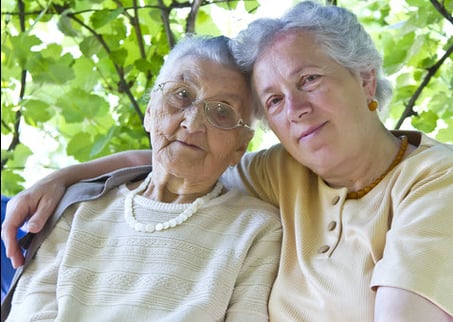While caring for a loved one offers a unique sense of fulfillment, it also comes with many responsibilities. According to "Stress in America: Our Health at Risk," a study from the American Psychological Association, more than half of all caregivers feel overwhelmed. Not only that, but they are far more likely to feel stress -- and its consequences -- than those who are not caring for someone. Read on to learn what you need to know about caregiver stress and how you can combat it in your own life.  Caregiving offers fulfillment, but it's also hard work.
Caregiving offers fulfillment, but it's also hard work.
The Facts on Stress and Caregiving
Do you lay awake at night? Binge eat or miss meals? Skip routine doctor check-ups? If so, you're not alone. Unfortunately, these behaviors are common in caregivers and can lead to long-term consequences.
Family caregivers are at increased risk for a number of health and wellness issues, ranging from heart disease to depression. Caregiver stress can also compromise your immune system and/or exacerbate pre-existing chronic health problems. Consider this eye-opening statistic: caregivers are five times more likely to get sick than non-caregivers. They even have a higher risk of premature mortality!
Caregivers are also more likely to feel like they're failing at adequately managing their stress levels. It can become a vicious cycle: in fact, many caregivers cite personal health as a primary source of their stress. Of course, awareness is a large part: to learn more about the signs and symptoms of caregiver stress, watch this video.
What Can You Do?
While caregivers often hear the phrase, "Don't forget to take care of yourself," this can be easier said than done. Here are some tangible ways to put yourself -- and your health -- first.
Seek Support
While asking for help can be hard, it's a significant part of overcoming overwhelmed feelings. Research shows that caregivers who feel supported not only have lower stress levels, but also experience fewer feelings of isolation. Don't be afraid to ask for help when you need it.
Also, take advantage of community resources for caregivers. If you don't have a friend or family member to talk to, look into support groups at your local hospital, community center or senior center. Online forums are also a valuable outlet for many caregivers.
Go Guilt-Free
While caregiving abilities are not something that can be measured or quantified, many caregivers still feel like they're failing because they hold themselves to unattainable standards. Acknowledging your own efforts and setting clear boundaries can help you avoid feelings of guilt. Some caregivers find that setting small goals helps them to embrace the fulfilling aspects of caregiving.
Take Time Out
Everyone needs some "me time," now and then, but the truth is that no one is going to come along and carve out this essential time off on your behalf. Today's "homework" is, take the initiative and do it for yourself.
Whether you go for a nature walk, visit your local library, or take a fitness class, these activities can help you relax and recharge. And there's only one rule: it must be something you enjoy, and you must set aside regular time each week to partake.
But remember: while it's perfectly fine to want time to yourself, social interactions are critical in keeping depression at bay, so make sure to stay in touch with friends and family members.
The Doctor Is In
Many caregivers are so busy keeping up with the appointments of their family members that they neglect their own. Unfortunately, this can have long-term repercussions for your health. Make sure to schedule your own regular check-ups, and let your doctor know if you are experiencing feelings of isolation or depression.
Caregivers play an invaluable role in society, and yet too many suffer serious and preventable health and wellness issues brought on by stress and lack of caregiver help. Educating yourself about caregiver stress, checking in with your feelings, and committing to combat burnout by taking the steps above can help you enjoy a more fulfilling relationship between you and the one you are caring for while also enhancing your quality of life.
For more information on caregiver stress, don't miss our Caregiver Stress video series. And remember: caregiver stress impacts millions of people; be sure to share this message with your family, friends and fellow community members to help raise awareness about this serious issue.
If you're looking for a comprehensive resource for family caregivers, check out our online Family Caregiver Guide.

